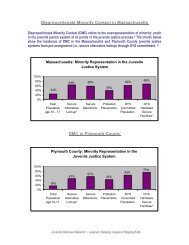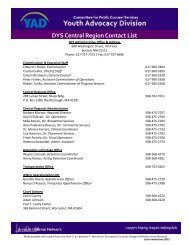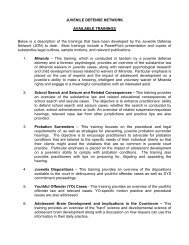States rethink 'adult time for adult crime' - the Youth Advocacy Division
States rethink 'adult time for adult crime' - the Youth Advocacy Division
States rethink 'adult time for adult crime' - the Youth Advocacy Division
You also want an ePaper? Increase the reach of your titles
YUMPU automatically turns print PDFs into web optimized ePapers that Google loves.
Teen Brains on Trial: Science News Online, May 8, 2004<br />
The prospect of gaining or losing money elicited many common responses in<br />
<strong>the</strong> brains of teens and young <strong>adult</strong>s, <strong>the</strong> scientists reported in <strong>the</strong> Feb. 25<br />
Journal of Neuroscience. However, on potential moneymaking trials, teens<br />
displayed unusually weak activity in <strong>the</strong> right ventral striatum, a structure at<br />
<strong>the</strong> brain's base that's been implicated in fueling <strong>the</strong> motivation to acquire<br />
rewards.<br />
This finding is consistent with <strong>the</strong> <strong>the</strong>ory that <strong>the</strong> amount of stimulation that's<br />
enough to give <strong>adult</strong>s a motivational boost is insufficient to arouse teens. To<br />
get <strong>the</strong> same rewarding feeling, teens may seek <strong>the</strong> added lift that comes<br />
from risky behaviors. Bjork and his coworkers plan to conduct larger fMRI<br />
studies of teen motivation that include youngsters prone to delinquency and<br />
drug abuse.<br />
There's still a long way to go in untangling how brain development influences<br />
what teens do and why <strong>the</strong>y do it, remarks Jay N. Giedd of <strong>the</strong> National<br />
Institute of Mental Health in Be<strong>the</strong>sda. Courts and legislatures grappling with<br />
<strong>the</strong> juvenile death penalty none<strong>the</strong>less need to consider <strong>the</strong> brain's unfinished<br />
status during adolescence, especially in <strong>the</strong> frontal lobes, according to Giedd,<br />
a pioneer in research on brain development.<br />
Adds neuroscientist Bruce McEwen of Rockefeller University in New York<br />
City, "There's enough known about brain development to call <strong>for</strong> serious<br />
discussions between scientists and <strong>the</strong> legal community."<br />
Immature data<br />
UCLA's Elizabeth Sowell, ano<strong>the</strong>r prominent brain-development researcher,<br />
takes a dim view of <strong>the</strong> movement to apply neuroscience to <strong>the</strong> law. Delayed<br />
frontal-lobe maturation may eventually be shown to affect teenagers' capacity<br />
to make long-term plans and control <strong>the</strong>ir impulses, she says, but no current<br />
research connects specific brain traits of typical teenagers to any mental or<br />
behavioral problems.<br />
"The scientific data aren't ready to be used by <strong>the</strong> judicial system," she<br />
remarks. "The hardest thing [<strong>for</strong> neuroscientists to do] is to bring brain<br />
research into real-life contexts."<br />
The ambiguities of science don't mix with social and political causes, contends<br />
neuroscientist Bradley S. Peterson of <strong>the</strong> Columbia College of Physicians and<br />
Surgeons in New York City. For instance, it's impossible to say at what age<br />
teenagers become biologically mature because <strong>the</strong> brain continues to develop<br />
in crucial ways well into <strong>adult</strong>hood, he argues.<br />
A team led by Sowell and Peterson used an MRI scanner to probe <strong>the</strong> volume<br />
of white and gray matter throughout <strong>the</strong> brains of 176 healthy volunteers,<br />
ages 7 to 87. The researchers reported in <strong>the</strong> March 2003 Nature<br />
Neuroscience that myelin <strong>for</strong>mation—measured by <strong>the</strong> total volume of white<br />
matter in <strong>the</strong> entire brain—doesn't reach its peak until around age 45.<br />
Although gray matter volume generally declines beginning around age 7, it<br />
steadily increases until age 30 in a temporal-lobe region associated with<br />
language comprehension.<br />
Such findings underscore <strong>the</strong> lack of any sharp transition in brain<br />
development that signals maturity, according to neuroscientist William T.<br />
Greenough of <strong>the</strong> University of Illinois at Urbana-Champaign. Definitions of<br />
file:///L|/JDN/Brain%20Resources/Brain%20Development/Mailing%20Packet/10.%20Teen%20Brains%20on%20Trial.htm (5 of 9)8/16/2006 4:45:04 PM
















